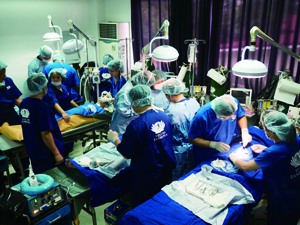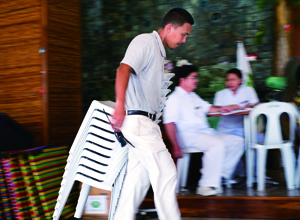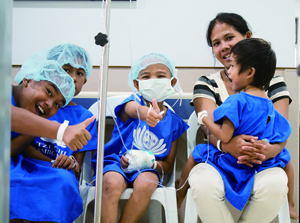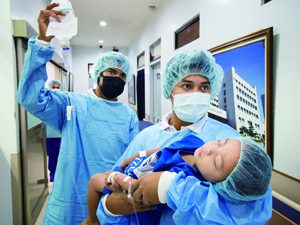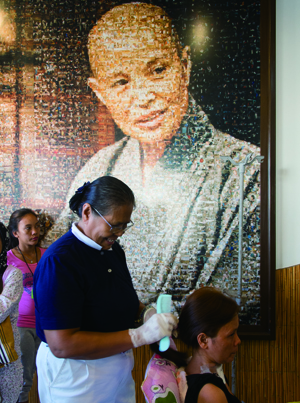

| New Legs, New Sight, New Life | ||||||||||||
| By Qiu Ru-lian Translated by Tang Yau-yang Photos by Hsiao Yiu-hwa | ||||||||||||
A “new leg” helps the wearer start his life anew. Likewise, the restoration of eyesight leads the beholder to happiness. Tzu Chi volunteers in Zamboanga have engaged in charitable and medical benevolence for the past 14 years. Every time they help a person, they also help a family.
Hector staggered into the Zamboanga City Medical Center on crutches, one foot in a flip-flop. His other foot had been amputated. He looked a little haggard, but excited—and understandably so. He was a bit haggard because he had just come off a two-day boat ride that had taken him from his hometown, all the way in Capiz Province, central Philippines, to Zamboanga, in the south. But he was excited because it would be a great day for his missing leg and a troublesome eye. He told the hospital guard that he needed to go to the Tzu Chi prosthesis center to receive his new prosthetic leg. After that, he would visit the nearby Tzu Chi Great Love Eye Center to have a polyp removed from his eye. Best of all, he would receive these services free of charge. “These actions helped me rise again to face life after Typhoon Haiyan,” he said.
Hector, 58, was once a karate instructor at a police academy. When he was in his 40s and in the prime of his life, one of his knees was injured during a karate competition. He paid little heed to what appeared to be a minor wound, but it worsened so badly that by the time he went to the hospital for treatment, an amputation was the only course of action. Instantly, he fell from the height of his life to the bottom of an abyss of misery. Unable to perform karate anymore, he lost his job. The burden of supporting the family fell on his wife, who ran a small grocery shop. In November 2013, Typhoon Haiyan hit the central Philippines, dealing a heavy blow to countless families in the area, including Hector’s. They began experiencing financial difficulties. A long-time friend of Hector’s sent him a message from Zamboanga, telling him about some free services—free prostheses and operations—that Tzu Chi was offering in the city for needy people. Hector promptly set out for Zamboanga. The Tzu Chi Great Love Physical Rehabilitation and Jaipur Foot Prosthesis Manufacturing Center (“the prosthesis center” in the rest of this article) is located in the Zamboanga City Medical Center. Arnel Perez Araujo, a technician at the prosthesis center, showed Hector how to put on his new leg and how to walk. Only Hector himself could do the actual walking. In the rehabilitation room, Hector held a handrail as he took careful, small steps. Araujo looked on closely to see if the new foot fit well. He knows that a prosthesis not only helps its wearer stand up again, but also invariably benefits the wearer’s family. “I couldn’t be more thrilled than when I see a person get on his feet again and walk steadily out of the center,” he said.
New legs Waldimar Rico, a colleague of Araujo’s, stirred plaster at a worktable nearby. Rico had once been a bus driver, the kind that stopped at any time to pick up riders. The days at this job were long, and he very quickly picked up smoking as a way to fight the boredom of the job. The chain smoking might have made the job less boring—but it had other effects too. According to Rico, the constant smoking amplified a negative effect of constant sitting: suppressed blood circulation in his legs. Gangrene developed in his left leg as a result, and it had to be amputated. The procedure saved his life, but he lost his job on top of losing a limb. In the next two years, his wife supported the family by washing clothes for others. Their 15-year-old daughter had to quit school, and she went to Manila to work. Rico just stayed at home, idle and totally dispirited. His wife learned that a fellow villager had gotten a new leg from Tzu Chi, so she looked into the matter. She went to see Anton Lim, who was in charge of the Tzu Chi Zamboanga office. Lim arranged for Rico to visit the prosthesis center for treatment. Araujo fitted a prosthesis on Rico’s left leg in 2004. Mobile again, Rico found work as a carpenter. Now his wife did not have to worry about him as much as she had. She did not need to wash clothes for others, and their daughter returned to school. Rico was happy about the way things had worked out—perhaps a bit too happy for his own good. In his new-found blissfulness, he returned to his old ways and picked up smoking once again. “Everybody around me smoked, so I slipped right back into the habit without ever noticing it.” The indulgence cost him his other leg in 2010. His wife sought help from the prosthesis center again after the second amputation, and another prosthesis was made. Rico, however, totally lost confidence this time; he sat idle at home all day long and did not want to leave the house. His wife had to start washing clothes for others again, and their daughter had to quit school once more. Rico wasted his life away during the day. At night he often had nightmares and would suddenly jolt awake, growling and shouting. His wife sought help from Tzu Chi volunteers, who visited Rico at his home. Since he was good at carpentry, they offered him a job at the prosthesis center. “Out of gratitude to Tzu Chi, I took the job, and here I am,” Rico explained. He has since quit smoking altogether, learned to make prostheses, and started his life anew. He said that he truly regrets his past behavior.
One time a police officer who had lost a leg in an accident came to the prosthesis center to try on an artificial limb. Despondent, he asked Araujo, who was helping him: “You have both of your legs, can you understand my pain?” Araujo was stumped; he did not know how to answer that question. Right at that moment, Rico, who was sitting off to one side, stood up. Pulling up the legs of his pants, he said to the officer, “Do you think I can understand your pain?” The officer looked at Rico, and saw that despite being a double amputee, Rico could walk like a normal person and work at the center. Feeling his own real leg, the officer suddenly felt much better. A new strength arose in him. “We’re proud of Rico,” Araujo commented. “Every time a new patient comes in, dispirited and claiming that a prosthesis won’t ever change the fact that they are disabled, Rico shows his legs to the patient and says, ‘If I can do it, so can you.’” Many people in Mindanao, the island where Zamboanga is located, need prostheses to replace limbs that had to be amputated due to illnesses or accidents. But the devices, which cost about two thousand American dollars each, are far beyond what destitute people can afford. Furthermore, people used to have to go to Manila to get a prosthesis. The combination of those costs forced many people in need of artificial legs to go without them. In light of this unmet need, Tzu Chi opened the Great Love Physical Rehabilitation and Jaipur Foot Prosthesis Manufacturing Center in 2004. The center helps not only those in need in Zamboanga—it also regularly holds prosthesis camps in Cebu, Bohol, and Basilan and gives out more new legs to people suffering without them.
Now the eye At the prosthesis center, Hector, the weary traveler at the beginning of this article, put a new shoe on his new leg. He could not stop smiling. He was glad that the required two-day journey had not discouraged him from coming to the center. As tiring as it was, it had been well worth it. After Hector left the prosthesis center, he went to the Tzu Chi Great Love Eye Center, which was also in the Zamboanga City Medical Center. He had an appointment there for an operation. A nurse told him that it would be a simple surgery and would not take much time at all. The doctor explained to him, “I’ll remove the polyp in your eye with electrosurgery.” Their explanations didn’t mean much to Hector, but no matter. The medical professionals’ gentle warmth did much to soothe his anxiety about the surgery, and that was all that mattered. On this day, Hector took care of two medical needs in one visit. The eye center was opened in 2008. Tzu Chi had by then already worked with the Zamboanga City Medical Center many times to offer free clinics to the needy, many of whom simply put up with their illnesses, such as cataracts and web-eye, instead of seeking treatment because they could not afford it. To help those people out, Tzu Chi, with government assistance, established the eye center. There are four dedicated operating rooms on the second floor, which are also used during Tzu Chi free clinics to perform surgeries for goiters, benign tumors, or hernias. Prior to the opening of the Tzu Chi eye center, the operating rooms in the medical center were shared by all services, which caused long waiting lines. The Tzu Chi eye center freed up much needed operating room space and allowed operations to be performed more efficiently. Raymond Sinining, 29, himself a beneficiary of the eye center, now works there. He always wears a shy smile, and he has every reason to smile these days: He has a kind wife and lovely children. Yet, at one time he thought that a happy family was beyond his reach. As a student, Sinining always sat in the front row at school because he could not see well. He often had to borrow notebooks from his classmates to copy in order to keep up with the teachers’ instructions. Doctors said that he would outgrow his vision problems, but he never did. He wanted to go to college when he graduated from high school, but his poor eyesight made that impossible. When he wanted to work to help pay the tuition for his two younger brothers and a younger sister, his poor eyesight again prevented him from doing that. People suggested that he seek help from Tzu Chi. With help from the foundation and the Zamboanga City Medical Center, he was diagnosed with a congenital cornea disease. The doctor put him on the list to receive a donated cornea. “I was really lucky,” Sinining recalled. “I learned only a few days later that a donor had been found for me.” He has been able to see the world clearly since the transplant in 2005, when he was 20 years old.
When the Tzu Chi Great Love Eye Center opened, he was offered a job there to help keep the operating rooms clean, set up instruments, and get cots ready for emergency use during free clinics. Soon after starting the job, he met his future wife, got married and started a family. “Tzu Chi has changed my life,” Sinining remarked with a smile. “Every volunteer here treats me like their family. I’m really grateful to them.” How it all started In 1998, Drs. Siu Chuan Leh (呂秀泉) and Josefino Qua (柯賢智) led members of the Tzu Chi International Medical Association (TIMA) in the Manila area to Zamboanga to offer free clinics to people in need. When beset with diseases, most poor people could only suffer through them, often in discomfort, sometimes in great pain and agony. “An operation may cost more than 15,000 pesos [US$340],” said Dr. Qua. “The average income here is 280 pesos a day, so obviously the average family cannot afford an operation.” However, untreated diseases do not normally just go away. It was not uncommon during free clinics to see patients whose throats were as big as soccer balls, telltale signs of enlarged thyroid glands. Likewise, there were people who had suffered with hernias for a long time. All they could do when the symptoms flared up was to push the bulging protrusions back into their body cavities. Those people would probably not have been there at the Tzu Chi clinics if the medical treatments had not been free of charge. “Many people lose their jobs because of diseases that cause pain or disfigurement,” said Anton Lim, head of the Tzu Chi Zamboanga office. “It makes their lives difficult, and their children may even have to drop out of school. There are countless families like that.” Lim added: “Saving one person often means saving an entire family.” This notion helped propel the formation of the Tzu Chi Zamboanga office in 2000. Volunteers began to carry out medical philanthropy in earnest, giving free medical treatments and distributing free medicine. Two months after the office opened, a young mother brought her child to Lim and asked for help from Tzu Chi. Hydrocephalus had caused the boy’s head to swell to the size of a basketball. The build-up of brain fluid was threatening his life and needed to be surgically drained, but the 200,000-peso price tag for the operation was beyond anything the fishing family could afford. Lim and his fellow volunteers quickly started a fund-raising drive, but the child died before they could collect enough donations. Helping patients like this involves heavy expenses for surgery, rehabilitation and care, so such cases are shunned by most charitable organizations. With this case, Lim discovered that there were no organizations dedicated to the care of hydrocephalic children. In response, Tzu Chi and the Zamboanga City Medical Center began jointly offering free medical treatment for hydrocephalic children in 2000. The medical center examines and operates on patients, and Tzu Chi underwrites the expenses. Many children have benefited from this program in the last 14 years.
In Zamboanga, Tzu Chi free clinics have been offered since 1998 and hydrocephalus assistance since 2000. The prosthesis center opened in 2004 and the eye center in 2008. Three or four times a year, TIMA members in Manila visit Zamboanga to hold large-scale free clinics. The 65th large-scale free clinic there was held from February 27 to March 1, 2014. All day long, surgeons worked hard at operating tables. It is very difficult for anyone to stand for three days, even without doing anything. The surgeons in the free clinic did that, except they also had to focus on the precise tasks of surgery. Some surgeons wore compression stockings to prevent edema, and some wore back braces to prop up their spinal columns. All such precautionary or preventive measures notwithstanding, the lengthy work at the clinic took a toll on them all the same, making them stiff and sore. But all the discomfort vanished when they saw the patients breaking into smiles after surgery had rid them of their pain. Regardless of how tiring the work in the free clinic had been, the doctors were sure that they would be back for the next go-around. Over the years, thanks to these medical professionals and non-medical support volunteers, many patients have been cured and returned to work. Tzu Chi has indeed helped a lot of people, as well as the countless families behind them.
|
















|

